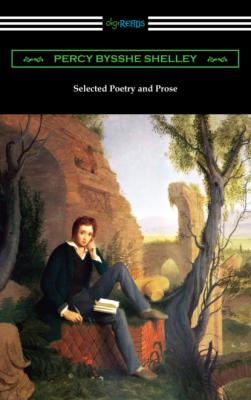Selected Poetry and Prose. Percy Bysshe Shelley
Чтение книги онлайн.
Читать онлайн книгу Selected Poetry and Prose - Percy Bysshe Shelley страница 43
 thou lamp of the free!
thou lamp of the free!
Guide us far, far away,
To climes where now veiled by the ardour of day
Thou art hidden
From waves on which weary Noon
Faints in her summer swoon,
Between kingless continents sinless as Eden,
Around mountains and islands inviolably
Pranked on the sapphire sea.
SEMICHORUS I.
Through the sunset of hope,
Like the shapes of a dream.
What Paradise islands of glory gleam!
Beneath Heaven’s cope,
Their shadows more clear float by—
The sound of their oceans, the light of their sky,
The music and fragrance their solitudes breathe
Burst, like morning on dream, or like Heaven on death,
Through the walls of our prison;
And Greece, which was dead, is arisen!
CHORUS.
The world’s great age begins anew,
The golden years return,
The earth doth like a snake renew
Her winter weeds outworn.
Heaven smiles, and faiths and empires gleam,
Like wrecks of a dissolving dream.
A brighter Hellas rears its mountains
From waves serener far;
A new Peneus rolls his fountains
Against the morning star.
Where fairer Tempes bloom, there sleep
Young Cyclads on a sunnier deep.
A loftier Argo cleaves the main,
Fraught with a later prize;
Another Orpheus sings again,
And loves, and weeps, and dies.
A new Ulysses leaves once more
Calypso for his native shore.
Oh, write no more the tale of Troy,
If earth Death’s scroll must be!
Nor mix with Laian rage the joy
Which dawns upon the free.
Although a subtler Sphinx renew
Riddles of death Thebes never knew.
Another Athens shall arise,
And to remoter time
Bequeath, like sunset to the skies,
The splendour of its prime;
And leave, if nought so bright may live,
All earth can take or Heaven can give.
Saturn and Love their long repose
Shall burst, more bright and good
Than all who fell, than One who rose,
Than many unsubdued.
Not gold, not blood, their altar dowers,
But votive tears and symbol flowers.
Oh, cease! must hate and death return?
Cease! must men kill and die?
Cease! drain not to its dregs the urn
Of bitter prophecy.
The world is weary of the past,
Oh, might it die or rest at last!
NOTES. [By Shelley]
NOTE 1. The quenchless ashes of Milan [line 60]: Milan was the centre of the resistance of the Lombard league against the Austrian tyrant. Frederic Barbarossa burnt the city to the ground, but liberty lived in its ashes, and it rose like an exhalation from its ruin. See Sismondi’s Histoire des Républiques Italiennes, a book which has done much towards awakening the Italians to an imitation of their great ancestors.
NOTE 2. The Chorus [line 197 et seq.]: The popular notions of Christianity are represented in this chorus as true in their relation to the worship they superseded, and that which in all probability they will supersede, without considering their merits in a relation more universal. The first stanza contrasts the immortality of the living and thinking beings which inhabit the planets, and to use a common and inadequate phrase, clothe themselves in matter, with the transience of the noblest manifestations of the external world.
The concluding verses indicate a progressive state of more or loss exalted existence, according to the degree of perfection which every distinct intelligence may have attained. Let it not be supposed that I mean to dogmatise upon a subject, concerning which all men are equally ignorant, or that I think the Gordian knot of the origin of evil can be disentangled by that or any similar assertions. The received hypothesis of a Being resembling men in the moral attributes of His nature, having called us out of non-existence, and after inflicting on us the misery of the commission of error, should superadd that of the punishment and the privations consequent upon it, still would remain inexplicable and incredible. That there is a true solution of the riddle, and that in our present state that solution is unattainable by us, are propositions which may be regarded as equally certain: meanwhile, as it is the province of the poet to attach himself to those ideas which exalt and ennoble humanity, let him be permitted to have conjectured the condition of that futurity towards which we are all impelled by an inextinguishable thirst for immortality. Until better arguments can be produced than sophisms which disgrace the cause, this desire itself must remain the strongest and the only presumption that eternity is the inheritance of every thinking being.
NOTE 3. No hoary priests after that Patriarch [line 245]: The Greek Patriarch, after haying been compelled to fulminate an anathema against the insurgents, was put to death by the Turks.
Fortunately the Greeks have been taught that they cannot buy security by degradation, and the Turks, though equally cruel, are less cunning than the smooth-faced tyrants of Europe. As to the anathema, his Holiness might as well have thrown his mitre at Mount Athos for any effect that it produced. The chiefs of the Greeks are almost all men of comprehension and enlightened views on religion and politics.
NOTE 4. The